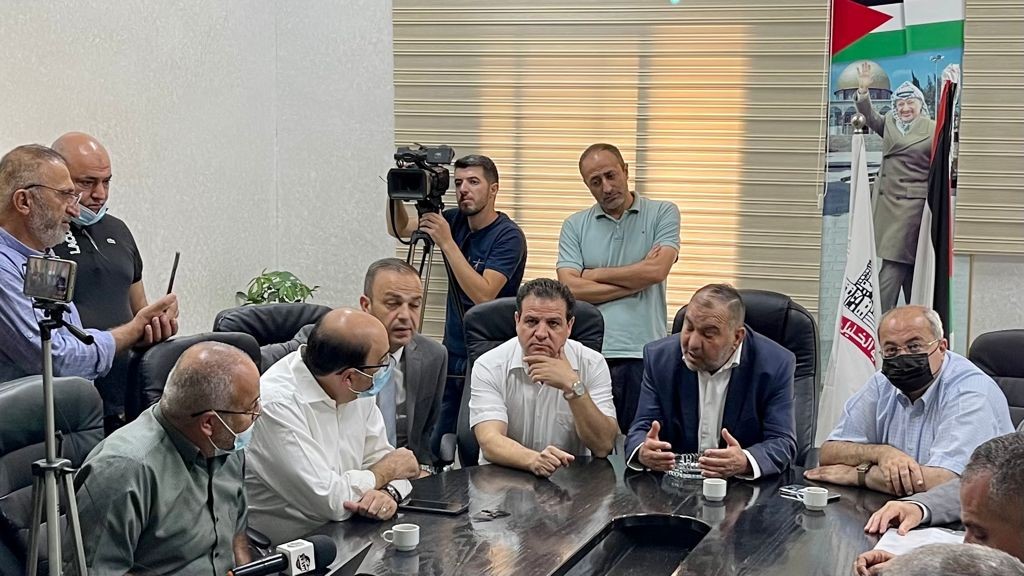The Joint List has announced that it will be lodging a complaint in the Knesset plenum against Israeli actions at the Ibrahimi Mosque (Cave of the Patriarchs) in Hebron. Palestinians officials there believe that recent Israeli actions in the city are part of plans to introduce a synagogue within the Ibrahimi Mosque compound: occupation forces are paving the way for a greater number of settlers to enter the site, are seizing additional land in its vicinity, and are exercising greater Israeli control over the holy site, steps aimed at altering its character and obliterating its identity.
After visiting the mosque last Saturday, August 14, members of the Joint List affirmed that they witnessed first-hand Israeli attacks on Palestinian rights at the site.

The Joint List delegation meets in Hebron with the city’s Palestinian authorities last Saturday, August 14, 2021. (Photo: Zo Haderech)
According Zo Haderech, the head of the Joint List, MK Ayman Odeh (Hadash), said that there is no doubt that Israeli occupation authorities want to change the Arab, Islamic and Palestinian character of al-Haram al-Ibrahimi. Odeh stressed that these violations are dangerously linked to the decisions to increase settlements in occupied Jerusalem and the rest of the Palestinian territories. Odeh arrived in Hebron last weekend to inspect the situation along with heads of the other parties in the Joint List.
The delegation toured the old city of Hebron, the Ibrahimi Mosque, and the municipality of Hebron, where they were received by the mayor, Tayseer Abu Sneineh, members of the municipality, the endowments committee, and the Chamber of Commerce. They were briefed on the Israeli military decision to seize lands in the vicinity of the Ibrahimi Mosque and shut down businesses in the Old City and its surrounding areas.
Abu Sneineh said that the visit of the delegation confirms the unity of the Palestinian people in all territories, and recalled the positions of members of the Joint List in the face of the occupation in the case of Sheikh Jarrah and the settlers’ storming of al-Aqsa Mosque. Mayor Sneineh pointed out that Hebron needs this support as the Israeli occupation has started implementing plans for Judaizing the city.
The head of the international relations department on Palestinian Colonization and Wall Resistance commission, Younes Arar, warned of the current danger in light of the occupation’s attempts to impose its control over the Mosque through the establishment of electronic checkpoints and repeated attempts to prevent the call to prayer. Arar reported that about 600 businesses have closed their doors in the area near the Old City, and since the second Intifada, more than 1,500 shops owners have been banned from opening their stores.
On August 12, the Directorate of Religious Endowments in Hebron decided to close all the mosques in the city, calling on worshipers to pray at the Ibrahimi Mosque, believed to have been constructed over the tomb of the Prophet Ibrahim (Abraham), in a bid to defend it and protect it from Israel’s plans. Thousands of Palestinians responded to the call, amidst tight Israeli security measures. The Israeli forces, which were deployed in the vicinity of the site and the old city, prevented hundreds of young men from entering the area, and fired tear gas at worshippers, after driving them out of its courtyards.
On August 10, the Israeli authorities began excavation works in the southern outer courtyards of the site under strict security measures, as part of the project that would alter the features of the Ibrahimi Mosque.
The decision to go ahead with the project appears to violate the Hebron Protocol, signed by the Palestinian Authority (PA) and Israel in 1997, which conferred the planning authority in the city to the PA. The protocol provides for the division of Hebron into two parts: Area H1, controlled by the PA, and Area H2 where the Ibrahimi Mosque is located and that is subject to Israeli security control. The protocol provided that the authority to grant building permits across Hebron in the two areas is the prerogative of the Hebron municipality.
Long a hot-spot for violence in the Occupied Palestinian Territories, the Hebron district has seen an uptick in settler violence since the start of the year. Approximately 1,000 Israeli settlers reside in the city of Hebron alongside a Palestinian population of more than 215,000. The settlers are protected by more than 2,000 Israeli soldiers, according to Israeli human rights organization B’Tselem.


